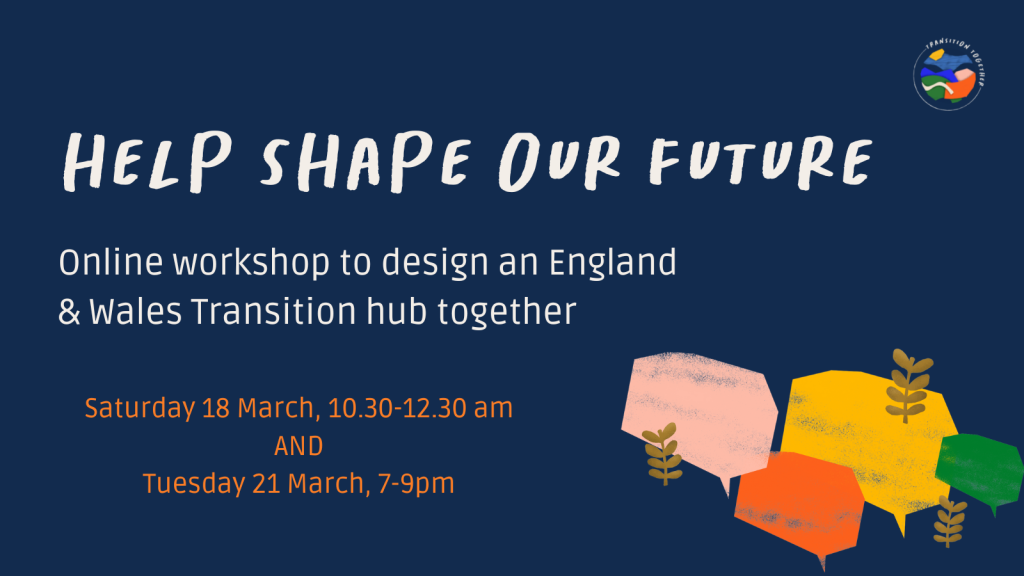Key questions for our future that need your answers

14 February 2023
5 minute read
What do you need from the Transition movement to help you feel like you belong? How could a Hub help your group thrive? What would make it accessible to you? Amy Scaife shares the exploration of the Caretaker group, which is helping develop a more representative structure to support the Transition movement in England and Wales, and invites you to join the process.
We find ourselves just over halfway through our journey together as five ‘caretakers’, carefully coaxing out a shape for what a hub for England and Wales could be.
As part of our research, we have interviewed representatives of international Transition hubs from around the world, as well as many regional hubs in the UK. All the conversations have been so different and so rich, each one conjuring up beautiful possibilities for our project.
Across all the conversations, we heard how storytelling fuels the movement through inspiration and knowledge-sharing, with international hubs often strengthening regional networks through training and events, or offering nuts and bolts support in the shape of governance guidelines, insurance and conflict management.
In our global conversations, certain themes emerged again and again, along with perspectives and experiences unique to the culture, history and politics of the hub’s home country. In Japan it was all about building a sense of family. Brazil’s Transition movement became a safe space to imagine what working together as a community could look like after the dangers of dictatorship had passed. With Scotland, we talked about how additional resources can unlock capacity and engagement right across the movement. In Mexico, the importance of structure and governance was emphasised. Care came up again and again, the importance of nurturing care between hub members, how this care (with time for creativity and fun) built all-important trust and energised the work to build the wider Brazilian Transition movement that is, in Brazil’s case, almost entirely un-funded.
We have also spoken to representatives of the various England and Wales regional hubs. At their best these hubs provide practical and emotional support for members, whilst developing the capacity to work effectively – both locally and at scale. Of the hubs interviewed, those that are really flourishing have found regular funding to support their work. Our discussions raised a lot of issues about capacity, ambition and burnout – and the tensions between volunteer effort and supported, resourced working.
Another question that arose was whether an extra layer of support at the national level might be out of reach of engagement activity at ‘transition town’ level – and also out of touch with climate crisis approaches that point at the need for hyperlocal working (e.g. Deep / Transformational Adaptation). This feels as though it is an opportunity for some creative thinking from us all, to co-design a hub that is really rooted in our needs at regional and local levels.
Across all of our conversations so far, we have learned that (broadly speaking) a good hub responds to the needs of localised transition groups within a region that could be a country or a county, helping create the conditions for further flourishing. There is no one-size-fits-all model, so we would like to invite interested Transitioners in England and Wales into a conversation. We would like to share with you what we have learned so far, and to hear from you.
Please click here for a very simple googleform with just three questions that would help us understand your needs from a hub for England & Wales. We want to know:
- What do you need from the Transition movement to help you feel like you belong?
- How could a Hub help your group thrive?
- What would make it accessible to you?
We will also be exploring the same questions in two webinars, on Saturday 18 March (10.30am-12.30am) and Tuesday 21 March (7-9pm). Find event details here.

The two sessions will be identical, and simply made available at different times to take into account the differing availability of Transitioners. We will also be present at the Regional Gatherings in May and June this year.
We are also strongly considering the impact of structural barriers to engagement and participation in the hub design and the movement more broadly. We intend to share more about this work over the coming months.
The process of exploring hubs and the representation of the transition movement in different regions has thrown up a lot of big questions, some of which feel quite fundamental to the way the Transition movement operates.
We would love to hear your responses to these questions. It should be your voices and your needs that shape a future Hub for England and Wales. Either fill in the questionnaire or join our webinars.
Let’s imagine … this is an opportunity filled with potential. In the context of work that is about creating conditions for transformational change – and in a dream of the “more beautiful world our hearts know is possible” (to quote Charles Eisenstein). We would welcome your involvement and creativity as we work together to plot out new possibilities, to strengthen our movement, to increase our connection to each other and to develop this lasting, just and resilient story together.
Here are the Caretaker Groups three key questions again, so you can share them with your group. Once you’ve had your discussion and collected feedback, one person can fill in the google form here. If that’s difficult, please do email us so we can find another way to receive your input.
- What do you need from the Transition movement to feel that you belong?
- How could a Transition Hub help your group to thrive?
- What would make an England and Wales Transition Hub accessible to your group?
Read more on the Caretaker group’s formation and work so far in our previous articles.